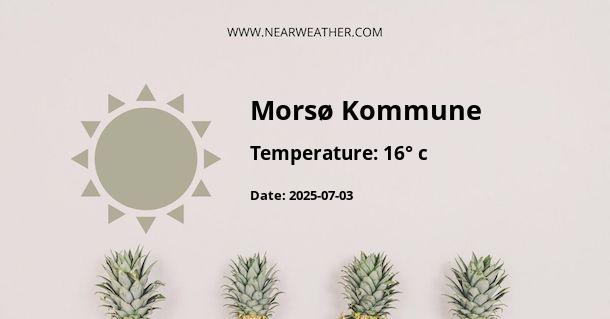Morsø Kommune, DK: Climate and Weather Year Round
Morsø Kommune is a picturesque municipality located in the northern part of Denmark. Situated on the island of Mors, it is known for its beautiful landscapes, charming towns, and rich cultural heritage. Understanding the climate and weather patterns of Morsø Kommune is essential for residents, tourists, and businesses alike. In this comprehensive guide, we will examine the climate and weather conditions throughout the year, providing detailed information and insights.
Geographical Location
Morsø Kommune is positioned on the western coast of Denmark, facing the North Sea. Its latitude is approximately 56 degrees north, placing it in the subarctic climate zone. The municipality covers an area of around 365 square kilometers, with diverse topography including coastal areas, rolling hills, and fertile farmland.
Climate Overview
Morsø Kommune experiences a temperate maritime climate, characterized by mild summers and relatively mild but wet winters. The North Sea plays a significant role in shaping the local climate, moderating temperatures and increasing precipitation. The combination of oceanic influences and the region's geographical features result in a unique climate pattern.
Seasonal Temperature Variation
The average annual temperature in Morsø Kommune ranges between 7 and 9 degrees Celsius (45-48 degrees Fahrenheit). However, there are noticeable variations throughout the year.
| Season | Average Temperature (°C) | Average Temperature (°F) |
|---|---|---|
| Spring (March to May) | 5-10 | 41-50 |
| Summer (June to August) | 15-20 | 59-68 |
| Autumn (September to November) | 10-15 | 50-59 |
| Winter (December to February) | 0-5 | 32-41 |
During summer, temperatures can occasionally reach 25 degrees Celsius (77 degrees Fahrenheit) or higher, providing pleasant conditions for outdoor activities. Winters are relatively mild compared to other regions at similar latitudes, with average temperatures just above freezing point.
Precipitation and Rainfall
Morsø Kommune receives a moderate amount of rainfall throughout the year, with the wettest months typically being August and September. The average annual precipitation in the region is around 800-900 millimeters (31-35 inches).
Below is a breakdown of average monthly rainfall:
| Month | Average Rainfall (mm) | Average Rainfall (inches) |
|---|---|---|
| January | 50-60 | 2-2.4 |
| February | 35-45 | 1.4-1.8 |
| March | 40-50 | 1.6-2 |
| April | 30-40 | 1.2-1.6 |
| May | 40-50 | 1.6-2 |
| June | 35-45 | 1.4-1.8 |
| July | 35-45 | 1.4-1.8 |
| August | 50-60 | 2-2.4 |
| September | 60-70 | 2.4-2.8 |
| October | 60-70 | 2.4-2.8 |
| November | 50-60 | 2-2.4 |
| December | 55-65 | 2.2-2.6 |
The precipitation is relatively evenly distributed throughout the year, with no significant dry season. The frequent rainfall contributes to the lush vegetation and fertile agricultural lands in the region.
Sunshine Hours
Morsø Kommune enjoys a moderate amount of sunshine, with an average of approximately 1,500 to 1,700 sunshine hours per year. The sunniest months are typically May to August, with an average of 6-8 hours of sunshine per day. In contrast, December and January are the darkest months, with only 1-2 hours of sunshine per day.
Weather Variability and Microclimates
It is important to note that weather conditions can vary within Morsø Kommune due to its diverse topography and proximity to the coast. Coastal areas may experience slightly milder temperatures and higher wind speeds compared to inland regions.
The western coast of the municipality is exposed to prevailing westerly winds, resulting in a slightly cooler and windier climate. In contrast, the eastern parts, shielded by higher ground and forests, experience a more sheltered microclimate.
Best Time to Visit Morsø Kommune
The best time to visit Morsø Kommune depends on personal preferences and the activities you plan to engage in. Summer, especially June to August, offers the warmest temperatures and longer daylight hours, providing ideal conditions for outdoor exploration, hiking, and visiting the beautiful beaches along the coast.
Spring and autumn are also pleasant seasons to visit, with milder temperatures and fewer tourists. These seasons offer opportunities to experience the stunning natural landscapes and enjoy cultural events and festivals in the local towns.
Winter can be a charming time to visit Morsø Kommune for those who appreciate a quieter atmosphere and the possibility of witnessing the occasional snowfall. The winter months offer a unique chance to explore the cozy towns, enjoy traditional Danish cuisine, and experience the local culture.
Conclusion
Morsø Kommune's climate is influenced by its geographical location, the North Sea, and its topography. The region experiences a temperate maritime climate with mild summers and relatively mild winters. Visitors and residents can expect moderate rainfall throughout the year, with the wettest months being August and September. The best time to visit depends on personal preferences, with summer offering the warmest temperatures and longest daylight hours for outdoor activities, while spring and autumn provide milder weather and fewer crowds. Regardless of the season, Morsø Kommune's natural beauty and rich cultural heritage make it an enticing destination to explore.
A - Morsø Kommune's Latitude is 56.783329 & Longitude is 8.750000.
A - Weather in Morsø Kommune is -1° today.
A - Climate Conditions in Morsø Kommune shows overcast clouds today.
A - Humidity in Morsø Kommune is 84% today.
A - Wind speed in Morsø Kommune is 26.57 km/h, flowing at 89° wind direction. today.
